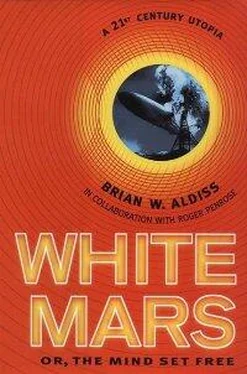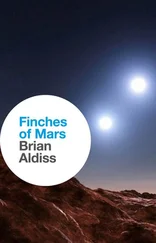Brian Aldiss - White Mars
Здесь есть возможность читать онлайн «Brian Aldiss - White Mars» весь текст электронной книги совершенно бесплатно (целиком полную версию без сокращений). В некоторых случаях можно слушать аудио, скачать через торрент в формате fb2 и присутствует краткое содержание. Год выпуска: 1999, ISBN: 1999, Издательство: Little, Brown UK, Жанр: Фантастика и фэнтези, на английском языке. Описание произведения, (предисловие) а так же отзывы посетителей доступны на портале библиотеки ЛибКат.
- Название:White Mars
- Автор:
- Издательство:Little, Brown UK
- Жанр:
- Год:1999
- ISBN:0-316-85243-0
- Рейтинг книги:5 / 5. Голосов: 1
-
Избранное:Добавить в избранное
- Отзывы:
-
Ваша оценка:
- 100
- 1
- 2
- 3
- 4
- 5
White Mars: краткое содержание, описание и аннотация
Предлагаем к чтению аннотацию, описание, краткое содержание или предисловие (зависит от того, что написал сам автор книги «White Mars»). Если вы не нашли необходимую информацию о книге — напишите в комментариях, мы постараемся отыскать её.
White Mars — читать онлайн бесплатно полную книгу (весь текст) целиком
Ниже представлен текст книги, разбитый по страницам. Система сохранения места последней прочитанной страницы, позволяет с удобством читать онлайн бесплатно книгу «White Mars», без необходимости каждый раз заново искать на чём Вы остановились. Поставьте закладку, и сможете в любой момент перейти на страницу, на которой закончили чтение.
Интервал:
Закладка:
“‘Why vex me with this recitation?’ I demanded. ‘Is it not more appropriate that the privies in our prisons should be down in the bowels of the earth?’
“Java Joe explained to me that he had thought much about this wonderful place, Crome, while passing his motions. He saw it all as a metaphor—although he did not know that particular word. From this vision of the good house his suggestion had evolved. Here he paused, searching my face with that good-natured gaze of his. I prompted him to go on.
“‘Us shits,’ he said, ‘should be kept separate as far as possible from the sewers of your prisons. We’ve never been far from their stink in all our lives. We should be placed in a good place with a view of heaven. Then we might be able to stop being shits.’”
Crispin looked about him to see what effect his story was having before he went on. “Was there anything in what Java Joe said? Maybe there was more sense than in all the rhetoric of my speech in the town square. I decided to act.
“We had an empty island or two in the Seychelles group. To the north was Booby Island, a pleasant place with a small stream on it. What was to be lost? I had it renamed Crome Island and shipped a hundred of my criminals there, to live in daylight rather than darkness.
“What a howl went up from the respectable middle classes! That men should enjoy themselves in pleasant conditions was no punishment for crime. This experiment would kill the tourist trade. It would cost too much. And so on…”
“Let’s get to the end of the tale, Crispin,” said Tom, with some impatience. “Obviously the experiment wasn’t a failure, or you would not be telling us about it.”
Crispin nodded cordially, saying merely, “We can learn from failure as well as success.”
“Come on then, Crispin,” said Sharon. “Tell us what happened to your criminals. I bet they all swam away to freedom!”
“They were marooned on an island round which fierce currents ran, and could not escape, my dear. They dug themselves latrines, they built a communal cookhouse, they built houses. All using just local materials. They fished and grew maize. They sat about and smoked and talked. They were prisoners—but they were also men. They regained their self-respect. A supply ship protected by armed guards called once a week at Crome Island, but no one escaped.
“And after their sentence was served, very very few reoffended. They had done what I could not manage to do, and reformed themselves.”
“What about Java Joe?” I asked.
Crispin chuckled. “He went to live voluntarily on the island; the convicts christened him King Crome.”
At this juncture Paula Gallin came and sat down at a nearby table, escorted by Ben Borrow. They were deep in conversation but, after they had ordered two sunglows, began taking an interest in our discussion, which certainly was not private.
“We hope,” said Belle, “to follow that example Crispin has offered. Earth is a planet full of prisons. It must never happen here. At one time, in a brief period of enlightenment, the British government permitted me to teach reading and writing to prisoners. The majority of people in prison, I found, were young bewildered men. They were ignorant and brutalised, two elements the penal system encouraged. Many had been brought up without a family. They had mostly been ‘in care’. They were truants from school, fly boys. Most of them hid deep misery under a hard shell.
“In a word, the prisons—not only the one in which I worked—were filled by the products of poverty, unemployment, underprivilege and depression. The politicians were locking up the victims of sociopolitical crimes.”
“Excuse me, you surely go too far there,” said Hal Kissorian. “We are mistaken in expecting politicians to remedy matters that are beyond political scope. That there are the rich and successful and the poor and unsuccessful, and every shade in between, is surely a natural and ineradicable phenomenon.”
I saw he glanced at Sharon for approval of his little speech. She gave him an encouraging wink.
Belle became so stern that her beads shook. “There is the case of nurture as well as genetic inheritance. Prison and punishment do not reconcile these unfortunate and malevolent youths with society. Quite the reverse. They leave prison only to reoffend more expertly. Of course I am speaking only of the reformable majority. A different case can perhaps be made for the mad and the really dangerous.
“It is when we come to consider the state of affairs beyond the prison walls that we see how unenlightened we have become. Judges are now constrained by their governments to deliver fixed sentences of a number of years for various crimes. Mandatory sentencing deprives the judges of administering justice according to the facts of the case. Thus both sides of the law become machine-like. Quantputers might as well take over, as no doubt they shortly will.
“How did mandatory sentencing become the rule? Firstly, because it speeded up the legal process, much as the banishing of juries has done. Then, later, it simplified the introduction of computerisation, to cut costs.
“All this because of the rise in crime. More and more people become imprisoned, and in consequence more violent and skilled in violence. Of course, the real crimemongers escape the law, as seems to be the case with the swindlers within EUPACUS. Our isolation here lasts so long because, to my mind, the law cannot indict the culprits.
“Most governments attempt to solve the increasing crime rate by building more prisons. They can’t adopt Crispin’s scheme of marooning them on a desert island to create their own society—”
“As we are marooned here—” Kissorian interjected.
“—so they continue to build prisons whose one objective is to maintain security, not to re-educate or train the inmates in various trades. So I’ll come to my point at last.
“All that is being done is worse than useless. Criminals are the activists of unjust societies. Our Dayo’s relatively innocent scam with his musical composition was a case in point; he strove merely to become equal, no more than that, in what he feels is a society unjustly prejudiced against his kind. Behind every young thug there are several depressed people, usually women, living out their short lives, battered and afraid and probably slow-witted. Undernourished certainly. And certainly harmless, within the meaning of the word. Hopeless, too. The cure for crime is not punishment but its reverse, love, caritas…
“We need a revolution that no politician would countenance—fundamental changes in society, with really good education for our children from the earliest age onwards. With a rebuilding of family life and the arts and pleasures of citizenship. Community work was a good start towards a caring society, but it did not go far enough.
“The civilised countries must increase taxes and invest extra revenues in rebuilding slums and lives, and listening to those who have had no say. In a very few years, I guarantee, the exorbitant cost of crime prevention would be diminished. A better and happier and more equable culture would result. And it would be found to be self-sustaining.”
Sharon clapped her pretty hands. “It’s wonderful. I can see it already.”
But Kissorian asked, “What happens to the abortion issue in this happier world of yours?”
It was Crispin who answered. “An unwanted child tends to retain his unwanted feeling all his life. Of course, that may turn him into a philosopher. It’s more likely he will turn to rape or arson or become the driving force of a security company, wielding a big stick.”
“So you’re pro-abortion?”
Belle said quietly, “For reasons I hope we’ve made clear, we’re pro-life. Which means at this stage of existence that we reserve the right of women to control their own bodies and to abort if they are driven to take such a grave step.”
Читать дальшеИнтервал:
Закладка:
Похожие книги на «White Mars»
Представляем Вашему вниманию похожие книги на «White Mars» списком для выбора. Мы отобрали схожую по названию и смыслу литературу в надежде предоставить читателям больше вариантов отыскать новые, интересные, ещё непрочитанные произведения.
Обсуждение, отзывы о книге «White Mars» и просто собственные мнения читателей. Оставьте ваши комментарии, напишите, что Вы думаете о произведении, его смысле или главных героях. Укажите что конкретно понравилось, а что нет, и почему Вы так считаете.










